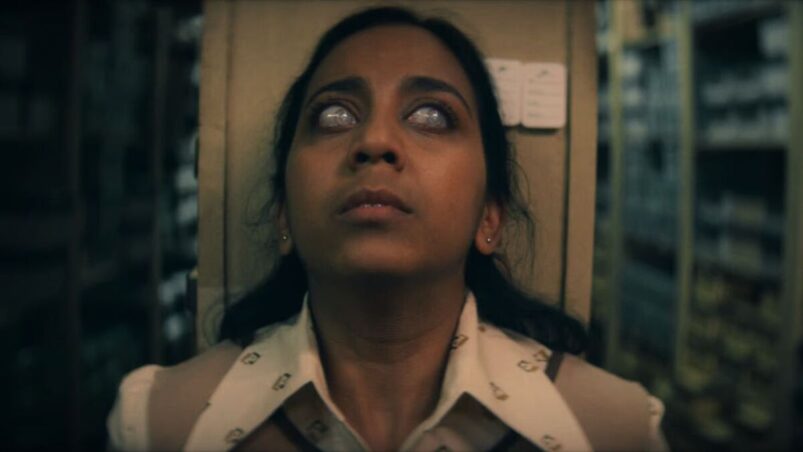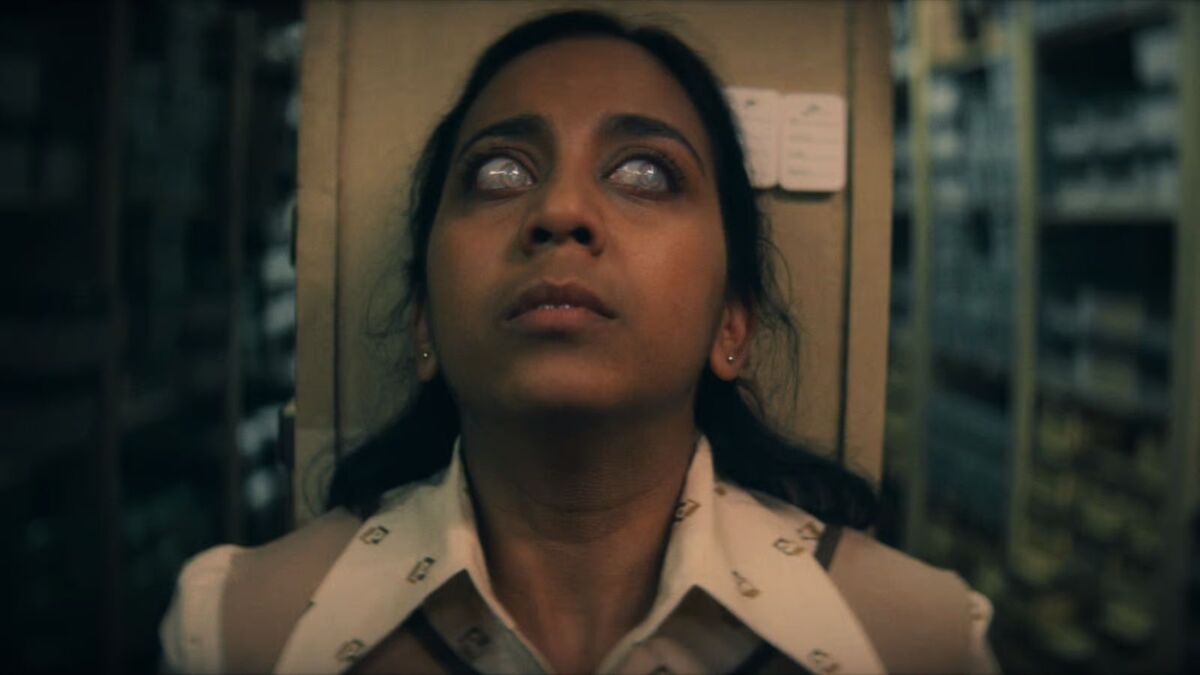A four-year sabbatical seems to be exactly what Black Mirror needed. The creeping Americanisation is no longer distorting the whole production around its service, when it wheels out the A-listers there’s a good reason for it, and, most importantly, the ideas – the hideous, beautiful ideas – behind it all are back to full strength.
After Netflix snapped up Black Mirror, ‘ideas’ became something less than the right word, and we ended up with episodes based not so much on ‘ideas’ as ‘gimmicks’. You had the Star Trek pastiche – ooh, remember Star Trek? – Miley Cyrus basically playing herself, and a worrying amount of episodes waving around the same piece of fictional technology, with rapidly diminishing returns.
The key to this sixth season seems to be pumping the brakes a little on the techno-fear that typified Black Mirror from the beginning. The technology’s still there, but learning from the lesson of the roundly acclaimed San Junipero, here it’s tempered through some (beautifully done) period pieces from the space-age sixties, the cassette-tape seventies, and the dial-up noughties. And, crucially, it’s not necessarily at the core of things. Some episodes even dispense with the techno-fear altogether and give way to what Howard Phillips Lovecraft would have called ‘sheer phantasy’.
In a way, this is Black Mirror surrendering a little to practicality. There may or may not be a limited number of horror stories you can tell about, say, Facebook, but Charlie Brooker can’t think of them all straight off the top of his dome. And here, clearly, he knows this, which is why the stories of this season lend themselves more to straight anthology material rather than the cyber-dystopia of a 15 Million Merits, or the extremely online catastrophe of The National Anthem.
The simple way to express that would be to say that they could fit right into The Twilight Zone, but that would have to carry a few caveats. Namely, that this would be an incredibly well-put-together Twilight Zone, rolling out all the tricks of the trade that have been trialled, refined, and proved since Rod Serling’s day.
Part of this is simply the production values it can bring to bear, and Black Mirror does still bear the scars and track marks of the Americanisation that came with being aquired by Netflix and their endless bag of money. One episode doesn’t simply take place in California, but in Hollywood California, the land of hills and switchbacks in which so many films are incongruously set.
(The total tally is three episodes in America vs. two in provincial Britain.)
But where this is most clear is with the way it toploads a whole host of big names into its first episode. This is something I would be scathing about if they hadn’t made it work so well. You’ve got Annie Murphy, Rob Delaney, and Salma Hayek, but at the same time you’ve got lesser-known but no less excellent talents like Lolly Adefope and Rich Fulcher alongside them. If this is the kind of cocktail Black Mirror can present us, then bring me another.
It is of course shamelessly self-indulgent for any Netflix production to make such a feature of an ever-so-slightly reskinned version of Netflix (here, ‘Streamberry’, with the red titles and all). It’s not as if Google ever winked and nodded and redirected anyone to television’s go-to search engine Finder-Spyder.
And in the old days, I probably would have cracked them good for that. ‘Your idea of self-deprecating irony is just masturbation’, I’d have said. But in those days Black Mirror was making a statement, of sorts, about technology – or at least a wild-eyed prophetic vision, this is what it’s capable of so be careful – whereas now it’s loosened its belt slightly. It has the breathing room to be slightly sillier.
A more incisive criticism would be that it’s abandoned some significant measure of its verisimilitude. Again, this is quite true, the classic techno-fear era often depicted no technology beyond what the average Westerner uses every day – but Black Mirror’s been sliding in this direction for some time, dabbling in technology like perfectly functioning AI or perfectly lifelike robots that might as well be magic.
(And, to its credit, one this season’s strongest instalments manages to wring exquisite tension out of nothing fancier than the VHS cassette.)
For the same reasons, you can’t really say this season of Black Mirror is taking more of a horror bent than years past, since that’s been there from the beginning. The technology was, and is, often just a catalyst, an excuse to unleash all the horrible things humanity’s capable of. When a bereaved man wants to steal his shipmate’s wife, the tension will be there, whether you’ve got fictional technology in the mix or not.
One thing Black Mirror frequently borrows outright from the horror genre – and specifically the slasher flick – is what is called the ‘ten minutes with idiots’, the opening setup of the bumbling clots who are going to be torn apart by Freddy or possibly Jason when the story actually gets going. Within an episode of Black Mirror, this can become excruciating, especially when ten minutes represents a much larger percentage of the show as a whole.
Here, though, they’ve managed to square the circle. The most nails-on-chalkboard of these idiot-laden intros quickly turns out to justify itself with the amount of payoff you get. Meanwhile, one of the longest – admittedly, a bit too long – is a morally murky quasi-detective yarn of its own, which only reveals itself as this kind of setup once it’s far, far too late to back out.
All told, if Black Mirror’s slightly refocused from techno-fear onto the gentle art of storytelling, that’s not necessarily a bad thing. We have not in recent years suffered from a lack of anthology shows – Love, Death & Robots, Inside No. 9, Guillermo del Toro’s Cabinet Of Curiosities – but Black Mirror’s been around long enough, and is a fine enough example of the form, that this glut is probably down to its influence, rather than it just being another on the pile.
READ MORE: 15 Best Horror Anthology Movies Of All Time
Some of the coverage you find on Cultured Vultures contains affiliate links, which provide us with small commissions based on purchases made from visiting our site.


